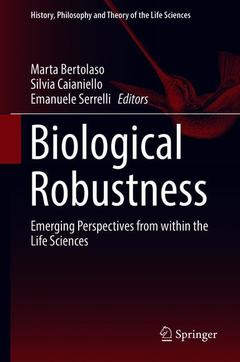Biological Robustness, 1st ed. 2018 Emerging Perspectives from within the Life Sciences History, Philosophy and Theory of the Life Sciences Series, Vol. 23
Coordonnateurs : Bertolaso Marta, Caianiello Silvia, Serrelli Emanuele

This volume reviews examples and notions of robustness at several levels of biological organization. It tackles many philosophical and conceptual issues and casts an outlook on the future challenges of robustness studies in the context of a practice-oriented philosophy of science. The focus of discussion is on concrete case studies. These highlight the necessity of a level-dependent description of robust biological behaviors.Experts from the neurosciences, biochemistry, ecology, biology, and the history and the philosophy of life sciences provide a multiplex perspective on the topic. Contributions span from protein folding, to cell-level robustness, to organismal and developmental robustness, to sensorimotor systems, up to the robustness of ecological systems.Several chapters detail neurobiological case-studies. The brain, the poster child of plasticity in biology, offers multiple examples of robustness. Neurobiology explores the importance of temporal organization and multiscalarity in making this robustness-with-plasticity possible. The discussion also includes structures well beyond the brain, such as muscles and the complex feedback loops involved in the peculiar robustness of music perception. Overall, the volume grounds general reflections upon concrete case studies, opening to all the life sciences but also to non-biological and bio-inspired fields such as post-modern engineering. It will appeal to researchers, students, as well as non-expert readers.
Marta Bertolaso is Assistant Professor for Philosophy of Science at the University Campus Bio-Medico of Rome, Faculty of Engineering, and member of FAST Institute of Philosophy of Scientific Practice at the same university. Her research concerns philosophy of science and philosophy of the life sciences with a specific focus on the dynamics of complex systems, on cancer and on the philosophical implications of the theoretical models that have been proposed to account for its occurrence. She is currently exploring the relationships between contingency, hierarchy and causal complexity in dynamic, engineered and living systems, drawing lessons for the modeling and epistemology of new bio-medical fields such as 'In Silico Medicine'. In particular, her interest deals with how features of organizational levels are structured and identified in scientific practice. She is coordinator of Bio-Techno-Practice, a Research Empowering Hub, and editor-in-chief of the book series Human Perspectives in Bio-Medical Sciences and Technology (Springer).
Reviews examples and notions of robustness at specific levels of biological organization
Grounds general reflections upon concrete case studies
Addresses core issues with clear and accessible language, favoring non-expert readers and fostering interdisciplinarity
Date de parution : 01-2019
Ouvrage de 258 p.
15.5x23.5 cm
Disponible chez l'éditeur (délai d'approvisionnement : 15 jours).
Prix indicatif 105,49 €
Ajouter au panierThèmes de Biological Robustness :
Mots-clés :
Adaptive Design; Biological Networks; Biological Robustness; Biological Systems; Causation; neurological system adaptation; central nervous system evolution; biomimicry engineering; Plasticity in biology; temporal organization robustness; multiscalarity robustness; robust design Jen; neuroscience robustness; Wagner Robustness and Evolvability; development organisms adaptive; Bateson Plasticity Robustness Development Evolution; ecological robustness; evolutionary robustness; developmental robustness; systems biolog



